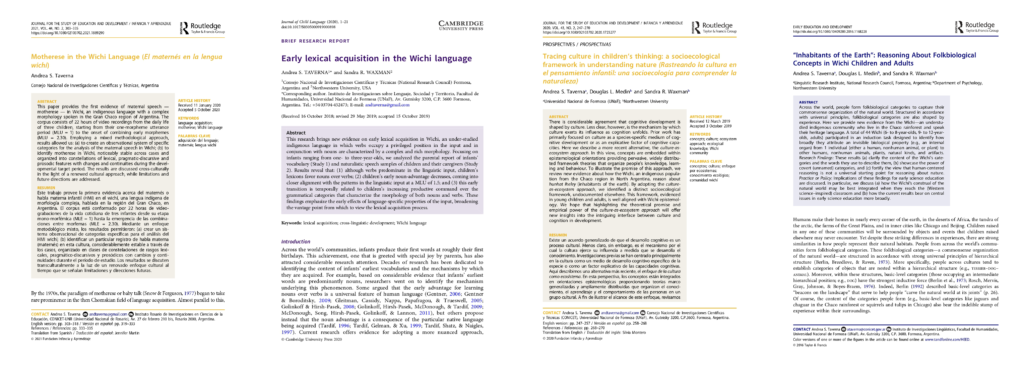Skip to content
Boyette,A.; Gurven, M.; Ndlovu, N.; Cristia, A.; Crittenden, A.; Amir, D.; Dzabatou, A.; Kandza, V.; Kanngiesser, P.; Pope-Caldwell, S.; Schäfer, M. & Taverna, A. Preparing for the field https://www.openbookpublishers.com/books/10.11647/obp.0440
Reide, F.; Groupon, I.; Nowell, A.; Medabots, C.; Silan, M.; Keller, H.; Nielsen, M; Greenfield, P.; Takada, A.; Coppens, A.; Pami, G.; Ferreira, B.; Taverna, A. ; Wesman, K.; Gomes, A. (2025). Charting a middle course: Theory and methods in the practice of cross-cultural research https://www.openbookpublishers.com/books/10.11647/obp.0440
Taverna, A., Padilla, M.,Waxman, S. (2024). How pervasive is joint attention? Mother‐child dyads from a Wichi community reveal a different form of “togetherness”. Developmental Science. 27(5): e13471. doi: 10.1111/desc.13471. https://hunhatlheley.org/wp-content/uploads/2025/06/Developmental-Science-2024-Taverna-How-pervasive-is-joint-attention-Mother_E2_80_90child-dyads-from-a-Wichi-community-reveal.pdf
Ruiz, M. F., & Taverna, A. (2023). Native ontological framework guides causal reasoning: Evidence from Wichi people. Journal of Cognition and Culture, 23(3-4), 397–419. https://hunhatlheley.org/wp-content/uploads/2025/06/15685373_023_03-04_s007_text.pdf
Taverna, A., Padilla, M.,Waxman, S. (2024). How pervasive is joint attention? Mother‐child dyads from a Wichi community reveal a different form of “togetherness”. Developmental Science. 27(5): e13471. doi: 10.1111/desc.13471.
Ruiz, M. F., & Taverna, A. (2023). Native ontological framework guides causal reasoning: Evidence from Wichi people. Journal of Cognition and Culture, 23 (3-4), 397–419.
Taverna, A. (2021). The motherese in the Wichi Language. Journal for the Study of Education in development, Infancia y Aprendizaje .https://doi.org/10.1080/02103702.2021.1889290
Taverna, A. , Baiocchi, M.C. (2021). Elaboración de sistemas semióticos wichí con una metodología colaborativa: libros infantiles ilustrados Hunhat Lheley (Habitantes de la Tierra) Confluencia de Saberes. Revista de Educación y Psicología, 3, 2, 12-37
Pérez, A., Pérez, E. M., Taverna, A. & Baiocchi, M. C. (2021). Hunhat lheley (Habitantes de la Tierra). EDUViM-EDUNaF
Taverna, A., & Padilla, M. I. (2020). Adquisición del wichí: hacia una metodología para el estudio del lenguaje infantil en una lengua nativa argentina . En C. P. Tramallino (Ed.), Homenaje a Zulema Solana: estudios de lingüística computacional, adquisición y enseñanza de lenguas (págs. 94-115). Roldán.
Taverna, A., & Waxman, S. R. (2020). Early lexical acquisition in the Wichi language. Journal of Child Language , 47(5), 1052-1072
Taverna, A., Medin, D. & Waxman, S. (2020). Tracing culture in children ‘s thinking: a socioecological framework in understanding nature (Rastreando la cultura en el pensamiento infantil: una socioecología para comprender la naturaleza). Infancia y Aprendizaje . DOI: 10.1080/02103702.2020.1723277
Taverna, A. S. , Padilla, M.; Baiocchi, M. & Peralta, O. (2020). Collaborative pedagogy: 3-year-olds bring pedagogical cues into alignment with analogical reasoning to extract generic knowledge. European Journal of Psychology of Education https://doi.org/10.1007/s10212-020-00475-4
Mareovich, F., Taverna, A. & Peralta, O. (2020). Adjective Learning by Spanish-Speakers Children and Adults. The Impact of Morphology and Semantic Information. The Journal of Genetic Psychology . 2-3, 54-67. 10.1080/00221325.2019.1709409
Baiocchi, M. & Waxman, S. & Pérez, E. & Pérez, A. & Taverna, A. (2019). Social-ecological relations among animals serve as a conceptual framework among the Wichi. Cognitive Development . 52. 10.1016/j.cogdev.2019.100807.
Taverna, A. , Medin, D.L., & Waxman, S.R. (2018). “Inhabitants of the earth”: Reasoning about folkbiological concepts in Wichi children and adults. In Marshall, P.J., & Brenneman, K. (Eds.) Young Children’s Developing Understanding of the Biological World, (pp. 7-27). Abingdon, England: Routledge.
Pérez, A., Pérez, E. M., Taverna, A. & Baiocchi, M. C. (2017). Hal’o
Pérez, A., Pérez, E. M., Taverna, A. & Baiocchi, M. C. (2017). Laloy
Pérez, A., Pérez, E. M., Taverna, A. & Baiocchi, M. C. (2017). Tshotoy
Pérez, A., Pérez, E. M., Taverna, A. & Baiocchi, M. C. (2017). Tshotoy fwiy’ohen
Pérez, A., Pérez, E. M., Taverna, A. & Baiocchi, M. C. (2017). Tshotoy inhot lheley
Taverna, A. S., Medin, D. L., & Waxman, S. R. (2016). “Inhabitants of the earth”: Reasoning about folkbiological concepts in Wichi children and adults. Journal of Early education and development , 27, 8 , 1109-1129.
Mareovich, F., Taverna, A. & Peralta, O. (2015). Enseñando palabras mediante libros ilustrados: El aprendizaje temprano de sustantivos y adjetivos. Interdisciplinaria , 32, 1, 89-107
Taverna, A. S., Waxman, S.R., Medin, D.L., Peralta, O. A. & Moscoloni, N. (2014). Naming living things: Linguistic, experiential and cultural factors in Wichí and Spanish speaking children . Journal of Cognition and Culture . 2-4, 213-233.
Taverna, A. S. y Peralta, O. A. (2014). Rutas hacia el Significado de las Palabras. Naturaleza, Experiencia, Construcción y Contexto . Estudios de Psicología. Vol. 31 (2).p. 115-131. Estudios de Psicología 31(2):115-131. DOI: 10.1174/021093910804952296
Taverna, A.S., Peralta, O.A. (2012) Young children category learning: a training study . European Journal of Psychology of Education 28(3) 599–617. https://doi.org/10.1007/s10212-012-0130-9
Taverna, A. S. y Peralta, O. A. (2012). Comparación e Inferencia en la categorización de artefactos no-familiares. Un estudio con niños pequeños . Psykhé . 21 (1), 21-36.
Taverna, A.S., Peralta, O.A. (2012). Formación de categorías supraordenadas en la niñez temprana. El papel de la instrucción. Infancia y Aprendizaje 35(2):135-149. DOI: 10.1174/021037012800217952
Taverna, A. S., Waxman, S. R., Medin, D. L., & Peralta, O. A. (2012). Core Folkbiological Concepts: New Evidence from Wichí Children and Adults , Journal of Cognition and Culture , 12 (3-4), 339-358. doi: https://doi.org/10.1163/15685373-12342079
Taverna, A.S. , Peralta, O.A. (2010). Routes towards creating word-meaning. Nature, experience, construction and context. Estudios de Psicología, 31(2 ):115-131
Taverna, A. S. y Peralta, O. A. (2010). Rutas hacia la formación del significado de las palabras. Naturaleza, experiencia, construcción y contexto . Routes towards creating word-meaning. Nature, experience, construction and context. Estudios de Psicología . Vol. 31 (2).p. 115-131.
Taverna, A. S. y Peralta, O. A. (2009). Conceptual Development: Current Approaches to Children’s Early Concept Acquisition. Psykhe 18(1):49-59
Taverna, A. S. y Peralta, O. A. (2008). Desarrollo Conceptual: Perspectivas Actuales en la Adquisición Temprana de Conceptos. Psykhe 18(1):49-59

